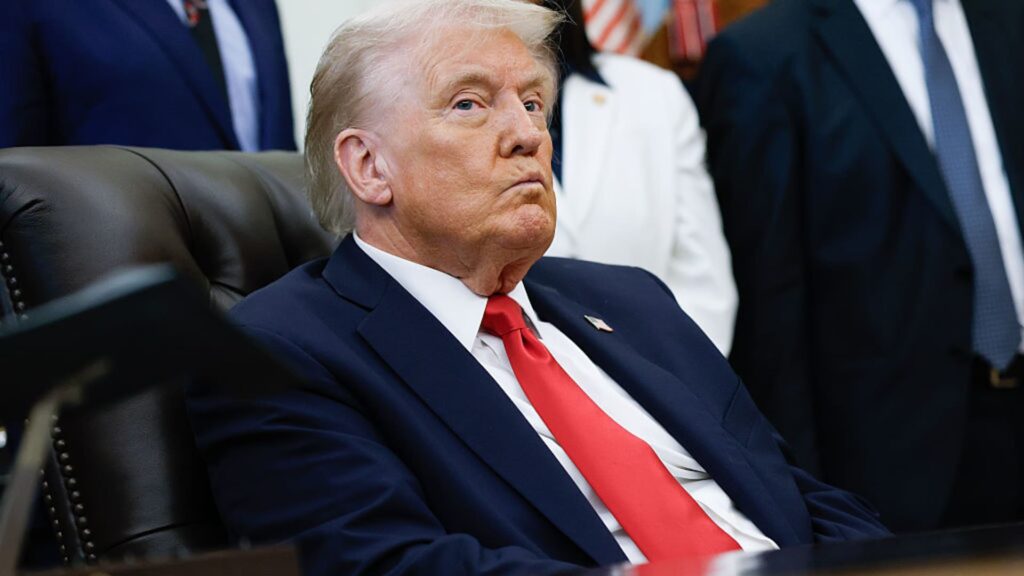
Americans’ views on the economy turned more negative in the third quarter with deepening concerns about jobs, inflation and the outlook, according to the CNBC All-America Economic Survey.
Together with blame for the shutdown aimed at the president and congressional Republicans, those views dragged down President Donald Trump‘s net approval rating on the economy to 42% approving and 55% disapproving.
The -13 net approval on the economy is the lowest of any CNBC survey during either of Trump’s two terms.
The president’s overall approval rating dropped to 44% from 46% while disapproval rose 1 percentage point to 52%. The results continued a second-term trend with his economic approval running below his overall approval rating.
In his first term, the president’s economic numbers were routinely positive and well above his overall polling.
The survey of 1,000 people nationwide, with a margin of error of +/- 3.1%, found 53% of respondents blaming the potential economic fallout from the shutdown on Republicans in Congress and the president, compared with 37% for Democrats.
But the survey also shows increasingly negative attitudes about the president’s handling of critical economic issues.
Just 34% of the public approve of his policies on inflation and the cost of living, with 62% disapproving. Those are the worst numbers of the three CNBC surveys during the president’s second term, an important finding for a president who promised to reduce prices. And 56% disapprove of his tariff policies, with 41% approving, a net approval of -15 compared with -6 in the second-quarter survey.
“It is clear that the cost of living in Americans’ own personal lives is much more likely to be weighing them down about their economic confidence than the shutdown,” said Micah Roberts, partner at Public Opinion Strategies, the Republican pollster for the survey.
Split by parties
The survey, in which 40% of respondents were Republican and 38% Democrat, shows Trump maintains overwhelming support from his party and faces equal opposition by Democrats. The key to the results is that independents lean substantially negative on the president and his handling of key issues.
“Most of the movement that’s happening now is among independents, and that’s important because we know … that independents are highly economically sensitive,” said Jay Campbell, partner at Hart Research, the Democratic pollster for the survey. “They’re less sensitive on partisan issues and they’re much more sensitive on financial and economic measures.”
The only positive issue among those surveyed is Trump’s handling of the southern border, which is +5. His handling of deportations moved from a 49-49 split to 46%-50% net disapproval. The president did have a slight improvement in views of his handling of foreign policy.
The survey was conducted Oct. 8-12, just after the announcement of an Israeli-Hamas peace deal. Still, the public is negative on his handling of the conflict by 41% to 50%.
The troubles for the president go beyond just the issues.
Views on the economy grew more negative, with 27% saying the economy is good or excellent and 72% describing it as just fair or poor, reversing an improvement in the second quarter after the president dialed back his most extreme tariff threats.
Just 32% of the public sees the economy improving next year, the lowest level since March 2024, while 46% believe it will get worse, unchanged from the prior survey.
Job worries grow
More than a quarter of Americans are concerned that they could lose their job in the next year, the highest level since CNBC first asked the question in 2022. But in a sign of confidence, 58% feel secure enough that they can find a new job with similar pay and benefits if they lose their current position.
Younger Americans, people of color and women are among the groups least confident in their job prospects. But college grads and salaried employees are also expressing elevated uncertainty relative to the average. Less than a third of working Americans believe their salaries will rise in the next year, the lowest since the pandemic while three-quarters see prices rising.
Half of the public say prices are continuing to go up “faster than usual.”
A 56% majority, including large numbers of Democrats and independents and 45% of Republicans, says it’s inappropriate for the government to be taking stakes in private companies.
A plurality of 43%, however, say Trump’s policies when it comes to business are “about right,” with 39% saying he’s too biased in favor of business and 12% saying he’s too biased against business.
(See the full survey here.)

